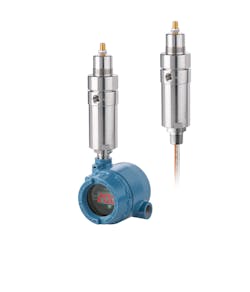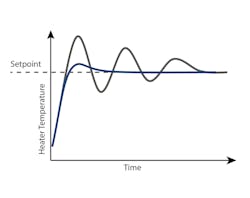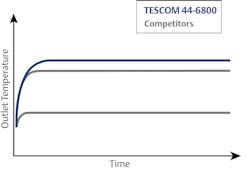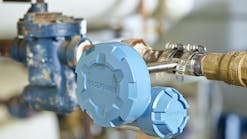Optimize vaporizing regulator performance with PID control
Refineries, petrochemical plants and other gas processing sites rely on online gas chromatography analysis to determine the composition of their products. These online results guide process unit conditions and ensure high product quality by providing continuous, real-time compositional data. Before being sent to the gas chromatograph (GC), samples taken off process lines must be conditioned — a process that removes particulates, reduces the pressure and ensures samples are completely vaporized. Although GCs are reliable instruments, their accuracy depends on the quality of delivered samples.
The role of the vaporizing regulator
Because GCs only accept vapor-phase samples, vaporizing regulators are a critical component of sample conditioning systems for GC analyzers. If the sample is a liquid, the vaporizing regulator fully vaporizes the sample into a gas. If the sample is already a gas, the vaporizing regulator provides enough heat to offset the Joule-Thompson cooling effect, preventing heavy components from dropping into the liquid phase during pressure reduction. Any liquid present in the sample not only impacts the quality of the analysis, but can also necessitate costly maintenance or repairs.
Heater options and challenges
To ensure the vaporizing regulator can provide enough heat to the sample to offset the Joule-Thompson effect, most suppliers require you to select a heater wattage based on process conditions. Doing so requires calculating the wattage based on theoretical heat transfer calculations and an assumed process stream composition — which is what you’re trying to determine via GC analysis.
It is during this process when users and system designers can run the risk of undersizing or oversizing the heater:
The advantages of a PID-controlled heater
One way to overcome these challenges is by using a vaporizing regulator with a built-in proportional-integral-derivative (PID) controller. As the name suggests, these controllers use the proportional, integral and derivative terms of a control function to continuously minimize any error between a measured process value and a desired setpoint. Commonly used in other industrial control applications, these controllers impart a significant control advantage in sample conditioning systems by continuously adjusting the heater output based on the core temperature. This advanced control feature eliminates the need to specify heater wattage for the regulator and lowers the risks associated with improperly sizing the heater and sacrificing optimal sample integrity.
The TESCOM 44-6800 Series vaporizing regulator with an integrated PID-controlled heater compares the heater setpoint temperature with the core temperature. It then continuously adjusts the heater output to achieve the target setpoint value. The TESCOM 44-6800 achieves the setpoint temperature faster than traditional vaporizing regulators with proportional-integral (PI) or proportional-only controllers, with no offset between the setpoint and process temperatures. The heater is rated for 100 watts at 120 volts and 400 watts at 240 volts. Because the PID controller continuously adjusts the heater output based on the measured core temperature, you don’t have to worry about sizing the heater, reducing the risk of undersizing or oversizing it.
You can adjust the temperature settings from 50° to 400°C as the sample composition changes, ensuring complete sample vaporization. It is recommended to maintain the temperature of the sample at least 16°C above the hydrocarbon dew point, consistent with current practices.
Accurate GC analysis — every time
The PID controller in the TESCOM 44-6800 Series vaporizing regulator eliminates the need to size the heater or select heater wattages based on process conditions. By continuously adjusting the heater output based on the core temperature, this unit requires only one heater size to accommodate changing process conditions. These advantages enable you to focus on optimizing your plant’s performance instead of worrying about sample integrity.
Allison Reiter is product marketing manager for precision fluid control at Emerson.
Allison Reiter
Allison Reiter is product marketing manager for precision fluid control at Emerson.





